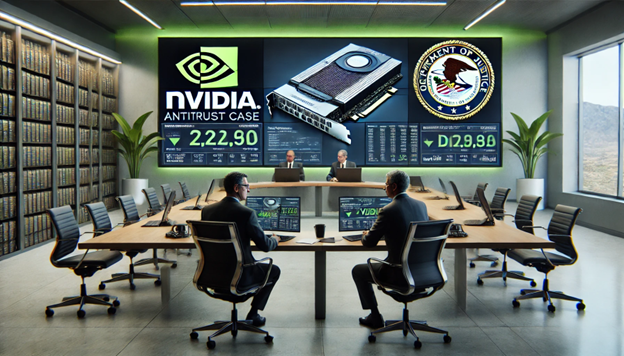Nvidia, the leading AI chipmaker, saw its stock rise by 3.5% on Monday after enduring a severe market crash that wiped out an astonishing $406 billion from its market capitalization. This massive decline, the worst in the history of public markets for any company, has not only rattled investors but also drawn the attention of the U.S. Department of Justice (DOJ).
Nvidia Stock Sees a 3.5% Recovery
After last week’s devastating drop, which resulted in a 13.9% loss over four trading days, Nvidia stock managed to bounce back slightly, rising by 3.5% on Monday. The timing of this uptick coincides with a tough week where the company’s market value took a record-breaking plunge, the biggest ever seen in such a short span.
The sell-off came after Nvidia’s quarterly earnings report failed to meet investor expectations, leading to a sharp decline in stock value. Despite having risen over 120% this year, Nvidia is still down approximately 16% in recent weeks. The recovery on Monday offers a glimmer of hope as the chip giant seeks to regain its footing in the competitive tech market.
Record Losses: $406 Billion Wiped Out in One Week
No company has experienced such a significant market decline in just a few days. Nvidia’s stock price dropped 9.5% on Tuesday alone, erasing a jaw-dropping $279 billion from its market cap within an eight-hour trading session. To break it down, the company lost about $35 billion per hour during that time. Over the course of the shortened four-day trading week (due to Labor Day), Nvidia’s market cap shrank by a staggering $406 billion, marking one of the most significant collapses in stock market history.
This rapid decline shocked the market, particularly given Nvidia’s dominance in the AI sector. The company’s high valuation had been supported by its leadership in AI chips, which have become crucial to the development of advanced technologies like generative AI, data centers, and autonomous systems. However, the volatile nature of the tech sector, combined with investor anxiety over Nvidia’s earnings, led to a swift downward spiral.

Justice Department Investigates Nvidia’s Market Dominance
Adding to Nvidia’s troubles, the Department of Justice has opened an investigation into the company’s business practices, specifically its partnerships with other tech giants. The DOJ’s antitrust division is scrutinizing how Nvidia and other major players in the AI industry may be collaborating to monopolize the AI chip market, effectively sidelining smaller competitors.
This investigation could have wide-reaching implications for Nvidia, as well as for the broader tech industry. Nvidia’s partnerships with companies like Google, Amazon, and Microsoft are under the spotlight, and the DOJ is questioning whether these alliances give Nvidia an unfair advantage in the AI chip sector. This type of scrutiny has become more common in recent years as regulators around the world seek to address anticompetitive behavior in the rapidly growing tech space.
Investors Remain Cautious Amid Ongoing Probes
The recovery in Nvidia’s stock price on Monday may have provided a brief respite, but the company’s challenges are far from over. The ongoing DOJ investigation could create long-term headwinds for Nvidia, as the potential for regulatory action looms. While the company continues to lead the AI chip market, it may face more pressure from regulators and investors alike.
Despite these concerns, Nvidia’s stock is still up 120% for the year, and the company remains a dominant force in the AI industry. Its role in developing advanced semiconductor technologies makes it indispensable to the growing demand for AI applications across various sectors. However, the recent stock drop and the scrutiny from the DOJ serve as a stark reminder that even market leaders are vulnerable to sudden shifts in investor sentiment and regulatory challenges.
Conclusion
Nvidia’s 3.5% stock rise on Monday was a welcome development after a brutal week that wiped out $406 billion from its market value. However, the company still faces significant challenges, including an antitrust probe by the DOJ and ongoing concerns over its dominance in the AI chip market. Investors will be keeping a close eye on Nvidia’s next moves, as the company works to recover from its historic losses and navigate the evolving landscape of AI technology.












